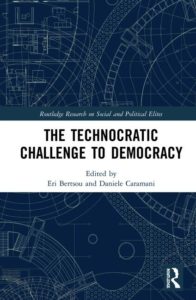Want to learn more about how the spread of #deepfake videos & #disinformation threaten our democratic elections? Watch our session w/ @Microsoft on the different strategies that social media platforms can take to curb infodemics – watch here https://t.co/vDNS9T9lT0 #DefendDemocracy pic.twitter.com/6YcOsjgakP
— Alliance of Democracies (@AoDemocracies) May 14, 2020
 Drawing on a new book, of The Technocratic Challenge to Democracy, co-editor Eri Bertsou, Senior Researcher in Comparative Politics at the University of Zurich, presents five lessons learned from research on technocratic politics and the role of independent experts in democratic systems:
Drawing on a new book, of The Technocratic Challenge to Democracy, co-editor Eri Bertsou, Senior Researcher in Comparative Politics at the University of Zurich, presents five lessons learned from research on technocratic politics and the role of independent experts in democratic systems:
1. Independent experts are key parts of modern democratic systems – even if technocratic power is often described as a counterweight to democratic power. …. Independence and scientific expertise allows technocrats to advocate for responsible governance – efficient and optimal outcomes that are an integral part of democratic political systems.
2. Technocratic expertise can be non-partisan, but not apolitical. The moment independent experts operate within politics, make political decisions, or are involved in the decision-making process, they become political actors. Political decisions are formulated to achieve specific goals and have important implications, often redistributive in nature….
3. False dichotomies: an important caveat of independent expertise in politics. The belief that there can only ever be a choice between a ‘correct’ decision or a ‘wrong’ one is a false dichotomy. It makes opposition to technocratic advice impossible….
4. Technocratic expertise can have a positive impact in many democracies. Studying the effect of technocratic politics within democratic systems shows that most of the time, technocrats are invited in democratic politics to address shortcomings and failures. …
5. People evaluate independent experts relative to partisan political actors and vice-versa. Technocratic cabinets emerge in the presence of a crisis, when the existing partisan actors are unwilling or unable to respond to the social, economic or structural failures of the system….RTWT
The Alliance of Democracies Foundation in cooperation with Microsoft’s Defending Democracy Program presents a 3-part webinar #DefendDemocracy Virtual Series: “What you see is what you trust?” to discuss what threat disinformation and synthetic media – so-called deepfakes – pose to democracies today and in the future (below).
Speakers: Hany Farid, Professor for Electrical Engineering & Computer Science, University of California, Berkeley Erica Greene, Non-resident Election Integrity Fellow, Alliance of Democracies Foundation Ashish Jaiman, Director Of Technology Operations, Microsoft Moderator: Eileen Donahoe, TCEI and Executive Director of Stanford’s Global Digital Policy Incubator.







